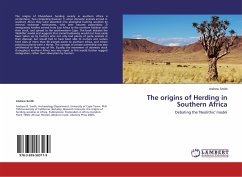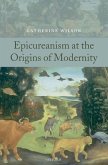The origins of Khoekhoen herding society in southern Africa is contentious. Two competing theories: 1) when domestic animals arrived in southern Africa they were absorbed into aboriginal hunting societies by internal exchange mechanisms, who later became pastoralists; 2) immigrating herders arrived from East Africa to the northern Kalahari with their stock, and spread to the southwestern Cape. This book debates the 'Neolithic' model and suggests that animal husbandry would not have easily been taken up by hunters who not only had plenty of game animals at their disposal, but would had to have been able to nurture and sustain herd sizes of more than 60 animals exotic to southern Africa, and where poisonous plants were a threat. The concept of private ownership was also antithetical to their way of life. Equally, the movement of domestic stock throughout southern Africa was very rapid, so this would further suggest immigration, rather than absorption by hunters.
Bitte wählen Sie Ihr Anliegen aus.
Rechnungen
Retourenschein anfordern
Bestellstatus
Storno









